Dozens gathered at the Concordia McConnell Building on Jan. 23 to support the launch of three specialized pop-up clinics that seek to address unmet needs in the public health care system. Delivered by Community Healing Days, a collective of alternative and traditional therapists, they will focus on providing trans, menstrual, reproductive, and perinatal health care.
The clinics will operate approximately once a month, offering low sliding scale rates to make their services more accessible to low-income patients. The clinics are funded by SHIFT Concordia’s Deep Investment Fund and will be run out of Studio 414 in downtown Montreal. The project includes a research component coordinated by McGill assistant professor Suparna Choudhury. This research aims to identify gaps in mainstream healthcare and the demographics most underserved. Organizers at Community Healing Days hope that their pilot project will serve as a model that can be replicated elsewhere in the city and beyond.
The new trans health care clinic will support patients as they prepare for and heal from gender-related surgeries. This support is offered through workshops and bodywork provided by trans and allied practitioners.
At the launch event, organizers stressed the need for more accessible care, especially amid the current health care crisis in Quebec. Kota Rook, a coordinator for the new trans health clinic, emphasized the difficulties that marginalized communities face when accessing care.
“We really particularly want to center people with very low income, and people who are racialized, Black, Indigenous, people of colour,” said Rook. “Because the more layers of things we’re experiencing in the world, the more barriers there are to health care.”
The Students’ Society of McGill University (SSMU) adopted a Gender Affirmation Care Plan last year, which expanded the Health and Dental Plan to cover more gender-affirming care procedures. However, Jacob Williams, a representative from McGill’s Trans Patient Union, highlights that the plan has some serious limitations. Currently, the plan requires students to obtain a gender dysphoria diagnosis before undergoing a procedure—despite the fact that this is not a legal requirement for receiving gender- affirming surgeries in Quebec. Furthermore, it does not cover certain procedures such as fertility preservation, nor the supplies needed for recovery after surgery. Additionally, the Plan’s maximum coverage is $5,000 for any one procedure with a lifetime maximum of $10,000.
“It’s a drop in the bucket,” said Williams. “The coverage amount is so low [that] it’s only really useful for a very small amount of things.”
Amina Kudrati-Plummer, SSMU’s VP Finance, told The Tribune that although they do not yet have any statistics on the success of the Gender Affirmation Care Plan, they are aware of students’ concerns and are hoping to increase coverage in the future.
“At SSMU, we are working towards expanding the overall coverage to meet the needs of the students more comprehensively,” said Kudrati-Plummer said.
Some members of the McGill community hope that projects like Community Healing Days’ new clinics can help address the unmet health care needs of students. Choudhury said that there is a disparity between the health care that is needed and what is available.
“These kinds of modalities have lots to offer and are sorely missing from what’s freely available [and] accessible to students,” Choudhury stated.
Others, including Keith Bellec-Warrick, finance coordinator of Union for Gender Empowerment at McGill, maintain that larger-scale change is needed to address the health care needs of trans people.
“It’s a question of a large-scale funding and organizational failure,” Bellec-Warrick said in an interview with The Tribune. “We welcome more changes in the future, but they’re not a favour, they’re not a gift. They are some attempt at addressing long- standing failures,”
Williams echoed Bellec-Warrick’s sentiment on welcoming change while emphasizing the need for wider structural changes to health care.
“I’m very grateful that projects like these exist [but] this shouldn’t be their job,” Williams said. “And it saddens me that like, basically, community organizers have to be the ones to step in to provide health care when [public] clinics can’t afford to.”
In the Jan. 30 print issue, The Tribune republished the piece “Dozens protest against CAQ’s anti-trans policies” under the title “Trans health clinic strives to address gaps in mainstream health care.” The Tribune apologizes for this layout oversight, to our contributors, and to the members of the queer and trans community who organized these separate events and gave us their time and words in interviews.
In next week’s issue, the intended article will be reprinted with this correction. We appreciate the opportunity to cover these events, and promise not to make this same mistake again.








